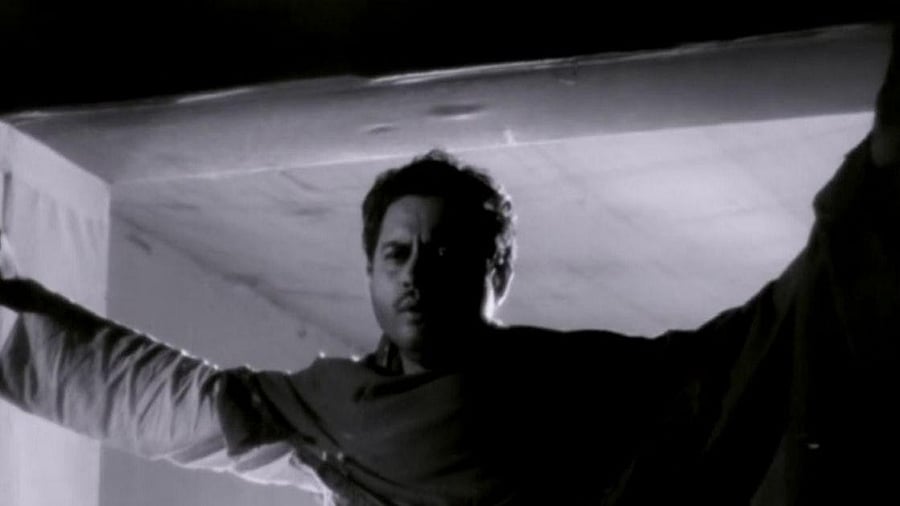
Starting his career as a choreographer, Guru Dutt evolved into a visionary writer, director, actor, and producer.
Credit: X/@FilmHistoryPic
When July 9, 2025, marks the birth centenary of Guru Dutt, the story of this master filmmaker, whose legacy in Indian cinema is defined by a collection of evergreen classics, once again takes the centrestage.
His life, tragically mirroring his art, bore a striking resemblance to the profound narratives he wove through the medium of celluloid.
From humble beginnings and early struggles, Guru Dutt's deep artistic yearning led him to Mumbai, where he forged his path, famously striking a career pact with actor Dev Anand early on.
Critics and fans across the globe consistently draw parallels between his real and reel life, often suggesting that his much-applauded characters—such as the film director Suresh Sinha of the cult-classic Kaagaz Ke Phool and the poet Vijay of Pyaasa, the only Hindi film to feature on Time magazine's "All-Time 100 Best Movies" list—were potent reflections of the director-actor’s own persona.
In his much-appreciated book, Guru Dutt: An Unfinished Story, Yasser Usman narrates an incident that eerily foreshadows the tragedy that visited the brilliant writer-director during the making of Kaagaz Ke Phool. Usman recounts how the famous music composer S D Burman, who scored the film, warned Guru Dutt, “Don’t make this film; it’s just your personal life.” To this, Guru Dutt famously retorted, “You concentrate on your music. Let me do my work.”
Unfortunately, the Guru Dutt-S D Burman pair, which delivered super-hit music in films such as Pyaasa and Kaagaz Ke Phool, never collaborated again.
The poignant climax scene of Kaagaz Ke Phool, where Suresh Sinha, the director played by Guru Dutt, broken and lonely, quietly enters a film set and dies sitting on the director’s chair, powerfully underscores the intrinsic link between his art and his very existence.
Renunciation and disillusionment are two pervasive themes that run across his movies. His role in Pyaasa, as Vijay the poet who renounces the world, is often cited as a masterclass in acting. Pyaasa, which explores the rejection of the world and life itself, was a film to which Guru Dutt gave his all; the climax, famously retaken 104 times, epitomizes this extraordinary dedication.
This relentless pursuit of perfection was a hallmark of his craft; his legendary cinematographer V K Murthy often recounted Guru Dutt's meticulous eye for lighting and framing, once even playfully remarking that he would make another film, just so Murthy could take all the time he needed for his shots. He kept his word by shooting his next film Kaagaz Ke Phool magnificently, which became India's pioneering CinemaScope feature.
Yet, Guru Dutt was not solely defined by melancholic masterpieces. He was a versatile filmmaker, successfully helming commercial hits like Mr. & Mrs. '55 and Chaudhvin Ka Chand. The latter's success, following the commercial disappointment of Kaagaz Ke Phool, proved his astute ability to balance artistic ambition with mainstream appeal.
It is presumed that the turmoil in his personal life hindered Guru Dutt's pursuit of even greater artistic heights. Rumours about his relationship with Waheeda Rehman, who was cast in many of his movies, added to the friction in his already strained marriage with singer-actor Geeta Dutt. They eventually started living separately in 1963.
The legacy of Guru Dutt, a multifaceted talent, extends beyond the brilliant movies he made; it also encompasses the rich talent he identified and promoted. His discoveries include actors Waheeda Rehman and Johnny Walker, writer Abrar Alvi, cinematographer V K Murthy, and writer-director Raj Khosla.
Though it would be incorrect to say that his films and talent were not acknowledged and appreciated during his lifetime, it would be an understatement to say that his popularity and cult following are growing by the day, even decades after his untimely death – he was only 39 when he passed away on October 10, 1964.
Many retrospectives, international festival screenings, and the increasing number of books written about him and his movies stand as testament to this growing global interest in the brilliantly multi-talented Guru Dutt.